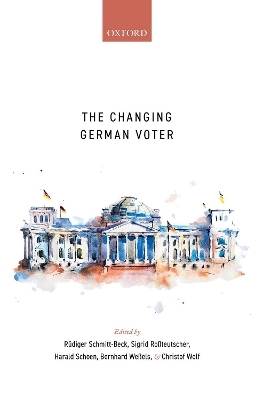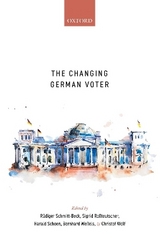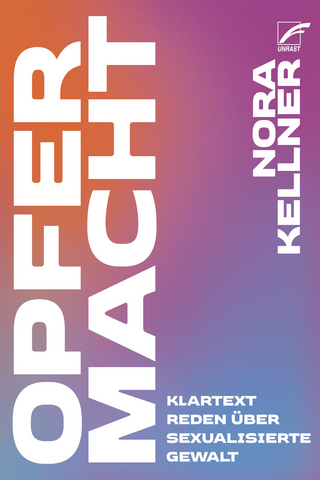The Changing German Voter
Oxford University Press (Verlag)
978-0-19-884751-9 (ISBN)
This is an open access title available under the terms of a CC BY-NC-ND 4.0 International licence. It is free to read at Oxford Scholarship Online and offered as a free PDF download from OUP and selected open access locations.
Over the past half century, the behavior of German voters has changed profoundly - at first rather gradually, but during the last decade at accelerated speed. Electoral decision-making has become much more volatile, rendering election outcomes less predictable. Party system fragmentation intensified sharply. The success of the AfD put an end to Germany's exceptionality as one of the few European countries without a strong right-wing populist party. Utilizing a wide range of data compiled by the German Longitudinal Election Study, the book examines changing voters' behavior in the context of changing parties, campaigns, and media during the period of its hitherto most dramatically increased fluidity at the 2009, 2013, and 2017 federal elections. Guided by the notions of realignment and dealignment the study addresses three questions: How did the turbulences that increasingly characterize German electoral politics come about? How did they in turn condition voters' decision-making? How were voters' attitudes and choices affected by situational factors that pertained to the specifics of particular elections? The Changing German Voter demonstrates how traditional cleavages lost their grip on voters and a new socio-cultural line of conflict became the dominant axis of party competition. A series of major crises, but also programmatic shifts of the established parties promoted this development. It led to a segmentation of the party system that pits the right-wing populist AfD against the traditional parties. The book also demonstrates the relevance of coalition preferences, candidate images as well as media and campaign effects for voters' attitudes, beliefs, and preferences.
Rüdiger Schmitt-Beck is a Professor of Political Science and Political Sociology at the University of Mannheim. Previously he held positions as a Professor of Political Communication at the University of Duisburg-Essen and as a Scientific Director at the Center for Survey Research and Methodology Mannheim (ZUMA). From 2007 to 2019 he was founding chairperson of the German Society for Electoral Research (DGfW). At the 2009, 2013 and 2017 German Federal Elections he has served as a co-Principal Investigator of the German national election study GLES (German Longitudinal Election Study). His research appeared in journals like the British Journal of Political Science, European Journal of Political Research, Political Communication, Electoral Studies and Party Politics, and with publishers like Oxford University Press and Routledge. Sigrid Roßteutscher is Professor at the department of Social Sciences, Goethe-University Frankfurt. Since 2009 she was a Co-Director of the German Longitudinal Election Study (GLES). At present, she is chairperson of the German Society for Electoral Research (DGfW). Her research interests focus on political participation, electoral behavior, turnout, political inequality, the role of religion in politics, value orientations, and social capital. She published in journals like the European Journal of Political Research, West European Politics, American Behavioral Scientist, European Sociological Review, Political Studies, and with publishers like Oxford University Press and Routledge. Harald Schoen is a Professor of Political Science at the University of Mannheim. He served as co-Principal Investigator of the German national election study GLES. His research focuses on political behavior and political psychology. It has been published in journals like the American Political Science Review, British Journal of Political Science, European Journal of Political Research, Journal of Communication, Political Behavior, Political Psychology, and Public Opinion Quarterly, and with publishers like Oxford University Press. Bernhard Weßels is Acting Director of the research unit 'Democracy and Democatization' at the WZB Berlin Social Science Center, and Professor of Political Science at Humboldt-Universität zu Berlin. He served as a member of the planning committee of the Comparative Study of Electoral Systems (CSES) for 14 years, directed the German CSES-Studies since 1998, and was a co-principal investigator of the German national election study GLES. He has published widely in the fields of political behavior, elections, and political representation. Christof Wolf is President of GESIS Leibniz-Institute for the Social Sciences, and Professor of Sociology at the University of Mannheim. He decisively supported the long-term institutionalization inter alia of the German Longitudinal Election Study and the European Social Survey in Germany; he also served on the boards of the International Social Survey Programme and the European Values Study. His research focuses on questions of survey methodology and social stratification. He edited several handbooks and published in journals, most recently in Public Opinion Quarterly, Comparative Population Studies and Journal of Marriage and Family.
Part I: Introduction
1: Rüdiger Schmitt-Beck, Sigrid Roßteutscher, Harald Schoen, Bernhard Weßels, and Christof Wolf: A New Era of Electoral Instability
Part II: A Fragmenting Party System
2: Martin Elff and Sigrid Roßteutscher: All gone? Change and Persistence in the Impact of Social Cleavages on Voting Behavior in Germany since 1949
3: Bernhard Weßels: Leaving the Space - Opening the Gap? Electoral Effects of Parties' and Voters' Repositioning
4: Lars-Christopher Stövsand, Melanie Dietz, Sigrid Roßteutscher, and Philipp Scherer: Issue Salience and Vote Choice: A Cultural Turn?
5: Lea Gärtner, Harald Schoen, and Alexander Wuttke: Ties That No Longer Bind? Effects and Responsiveness of Party Attachments in a Period of Crises
Part III: Challenged Voters
6: Aiko Wagner and Josephine Lichteblau: A New Player in the Game: Changing Electoral Competition in Germany
7: Simon Ellerbrock: Partisan Agreement and Disagreement in Voters' Discussant Networks: Contextual Constraints and Partisan Selectivity in a Changing Electorate
8: Reinhold Melcher: (In-)Consistent Voting in the 2009, 2013 and 2017 German Federal Elections
9: Sascha Huber and Robert Welz: Dynamics of Coalition Preferences and Vote Choices
Part IV: Situational Voting
10: Agatha Kratz, Maria Preißinger, and Harald Schoen: Changing Crises, Changing Votes? Problem Priorities, Party Competence, and Electoral Behavior in Germany, 2009-2017
11: Nils Jungmann, Ina Bieber, Manuela Blumenberg, and Konstantin Glinitzer: The Push and Pull of Political Leaders: Changing Candidate Evaluations and Vote Switching between the 2013 and 2017 Federal Elections
12: Jürgen Maier, Michaela Maier, and Thorsten Faas: Do Televised Debates Affect Voting Behavior? Evidence from the 2009, 2013, and 2017 German Federal Elections
13: Rüdiger Schmitt-Beck and Alexander Staudt: Media Biases and Voter Attitudes during the 2009, 2013, and 2017 Federal Election Campaigns
14: Julia Partheymüller and Richard Johnston: Plus ça Change? Stability amid Volatility in German Campaigns
Part V: Conclusion
15: Rüdiger Schmitt-Beck, Sigrid Roßteutscher, Harald Schoen, Bernhard Weßels, and Christof Wolf: The Changing German Voter
| Erscheinungsdatum | 12.04.2022 |
|---|---|
| Verlagsort | Oxford |
| Sprache | englisch |
| Maße | 165 x 241 mm |
| Gewicht | 760 g |
| Themenwelt | Sozialwissenschaften ► Politik / Verwaltung ► Politische Theorie |
| Sozialwissenschaften ► Politik / Verwaltung ► Staat / Verwaltung | |
| Sozialwissenschaften ► Politik / Verwaltung ► Vergleichende Politikwissenschaften | |
| ISBN-10 | 0-19-884751-3 / 0198847513 |
| ISBN-13 | 978-0-19-884751-9 / 9780198847519 |
| Zustand | Neuware |
| Haben Sie eine Frage zum Produkt? |
aus dem Bereich




